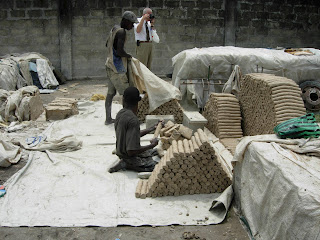When we were new to the DRC, we met Willmar, coordinator of a local NGO dedicated to helping the handicapped support themselves. Our first experiences with Willmar involved driving into areas that were a little frightening, like down the middle of a market or down what appeared to be a sidewalk. In the year that we have served in the DRC, we have grown to love and respect this man and appreciate how he serves. He has been a member of the Church about ten years.
Willmar's parents were educated in Paris, his father at the Sorbonne. They were ministers in a protestant church. At the age of ten, his father placed Willmar with a group of blind adults and told him to help them. He has been helping ever since.
Willmar's parents were educated in Paris, his father at the Sorbonne. They were ministers in a protestant church. At the age of ten, his father placed Willmar with a group of blind adults and told him to help them. He has been helping ever since.
Willmar's first work was at a school for blind children. He and a friend went door-to-door in the community to talk to parents about sending their children to school. The transport van contains the beds for blind students who cannot go home during the week (or even the term), a project he arranged with LDS HS.
Willmar helped to start a sheltered workshop for the handicapped by arranging with the World Bank to do a book binding project. With the money earned, they bought three sewing machines. After proving themselves capable of developing a self-sustaining model, LDS HS donated more machines for both a sewing center and a shoemaking center. Willmar is in the back of the truck with one of the treadle sewing machines.
Harriet (right) had been homebound before she received a wheelchair. Now she is an instructor of young handicapped women at the sewing center.
These two men had been remaking damaged sandals (i.e. flipflops). Now they produce sandals that are sold to the local community.
Willmar's group helped this couple start a small boutique (store) in their front yard. She had polio and doesn't have the use of her legs, he is on crutches. The handicapped here usually move about on hands and knees.
Some of the handicapped cannot work. This woman is a paraplegic, she lost the use of her legs shortly after her marriage and has been bedridden for many years. Willmar's NGO uses part of the income of their projects to assist her and others. At his request, we visited her for Christmas 2009.
Willmar is the first and so-far the best pupil for the enterprise training being offered by LDS HS and Tifie. His NGO started "processing" clay for use by the Chinese. Their first efforts were about a case which sold for 2,500 fc (about $3.00). Starting "small-small," they have slowly grown until the handicapped, who can export across the river for free, have a business taking cases of clay to Point Noire for direct sale to the Chinese for considerly more money. Willmar is pictured here explaining the process to Tommy Muhemedy of Tifie.

The men process the clay by pounding it from raw form into logs using water and salt. Tifie has provided solar lighting so that they do not have to work in the heat of the day.
The most telling story about Willmar is his work with Mabashi. Mabashi (in the chair) had polio as a child. He was deserted by his father and raised by his maternal grandparents. He began to earn a living as a funeral dancer -- gyrating on his hands for the entertainment of the crowd. Willmar saw him and talked him into learning how to sew. Everyday, Mabashi would crawl on his hands and knees to the sewing center -- down three miles of busy street. One day, a car ran over his legs. Willmar was called and carried him on his back to the nearest hospital. The hospital refused to treat him without money. Willmar stayed with him until morning, then went to Handicapped International where he raised enough money for the initial treatment. Because no one could feed Mabashi at the hospital (no food served in hospitals in Africa), Willmar carried him on his back three times a week to the hospital and home again. When the hospital stopped treating him, Willmar spent months raising the money for treatment. We thought Mabashi would die, that he could never heal after such an ordeal, but he is now back at work and using the wheelchair that Willmar obtained from LDS HS to get there more easily.
Willmar has spent many hours measuring people for our next wheelchair request -- his organization is working on training and maintenance issues. Our next wish for Willmar is that he will raise some money to get married!! We offered to pick out a bride for him, but he says he can handle that himself!












